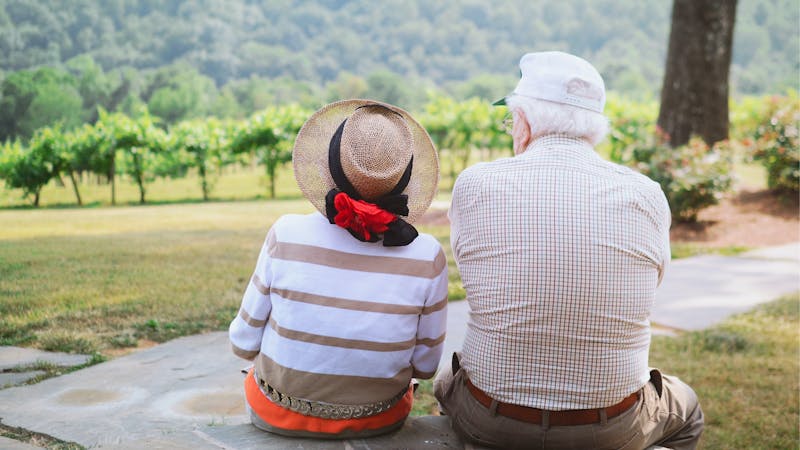8 Ways to Beat Social Isolation & Loneliness as You Get Older

Modern technology has helped us stay more connected than ever through social apps and word games like Words With Friends. Still, despite technological advances, many Americans report that, as a society, we may be lonelier than ever.
Forced social isolation saw many stuck in their homes, unable to see friends or family, further exaggerating that many people were already increasingly lonely and isolated before the global pandemic, especially those over 60.
However, it's important to recognize that social isolation isn't an inevitable part of aging, despite stereotypes telling us otherwise. In fact, there are numerous empowering strategies and activities that can help retirees maintain a vibrant and fulfilling social life way into the 70s.
The Negative Impact of Loneliness (and what we can do about it)
Significant research indicates that isolation is a leading public health concern, as loneliness and social isolation can negatively affect the body and mind. Scientifically having less people to interact with regularly is known to increase the production of cortisol, the body's stress hormone, impairing cognitive performance and increasing risks for health complications. Here are some statistics and ideas to keep in mind on the impact of social isolation and how it can affect the human body.
- Loneliness increases the likelihood of mortality by 26% (Perspect Psychol Sci)
- Loneliness and isolation are associated with poorer cognitive function among older adults (Care of the Older Person)
- People reporting loneliness have poorer sleep quality (Yoko Komada)
- Loneliness is associated with a 40% increased risk of developing dementia (Loneliness and the Risk of Dementia Pub: OUP)
- One in five elderly adults is socially isolated from family or friends, increasing risks for poor mental health. (University of Michigan)
So, with these in mind, what can we do about it?
Embrace Technology
From crosswords to beating your friends on a Words with Friends (WWF) game, there are tons of ways that those over 60 (and younger) can enjoy using technology – even if you don't know all the internet jargon! Get playing daily word games like WWF and online with your friends. Plus, brain training games for older adults are scientifically proven to improve cognitive skills, so it's a win-win!
Solve More Crosswords - Crossword Clues and Answers
In this dedicated segment, we've compiled a collection of our most popular crossword clues designed to bring people together. So, let's sprinkle some camaraderie into crossword solving – join us in deciphering clues that bridge connections and combat social isolation.
- Clue: Social Isolation 8 letters. The answer is: SOLITUDE
- Clue: Companion 9 letters. The answer is: ATTENDANT
- Clue: Social Gathering 8 letters. The answer is: FUNCTION
- Clue: Social Gathering 5 letters. The answer is: PARTY
- Clue: Friend (Sp.) 5 letters. The answer is: AMIGO
- Clue: Old Friends 9 letters. The answer is: COMPADRES
- Clue: Comrades 6 letters. The answer is: ALLIES
What's the best way to beat loneliness? There are many. But, one is solving games with friends. Whenever you're in a pickle, explore our crossword solver tool. We've done the hard work and compiled a database of popular clues so you can kick back and enjoy time with your nearest and dearest, or in 3 letters, FAM.
Nurture Friendships
Friendships come and go; that is true. However, the idea that new friendships only begin in your 20s is a complete lie, and best of all, the health benefits of having a strong network of friends and social support groups seem to increase the older you get.
With technology, you can find old childhood friends or pals from college that you might have lost touch with, nurture friendships, and keep the mind sharp by competing against each other in daily word games, or discover new connections at meetup groups, check out AARP communities, or find events that interest you in your local area.
Volunteer and Give Back
If you've got a bit of extra time or decided to retire, there are many ways you can give back to your community through volunteering.
First, don't volunteer for something out of peer pressure (because you feel obliged or because you think you need to.) Secondly, only volunteer for something you're truly passionate about. Don't know what that is yet? Check out AARP's volunteering portal, where you can explore causes where you feel you can make the most difference.
Do Something You’ve Always Wanted to (but didn't have time for)
You may or may not dream of doing a bungee jump or traveling the world (if you do, go for it!), but there is always time to take stock of what you want to do with it. Maybe you've been putting off learning how to cook a specific dish, or maybe you want to figure out how to take the perfect picture or set up an online business.
There are endless hobbies that get you out of your comfort zone and can help you meet like-minded individuals.
For the adrenaline junkies, Non-profit MyJump works with older adults to achieve their dreams and challenge ageism at the same time.
Get a Furry Companion
According to research linking pet ownership and social isolation, pets are an underrecognized channel for building social capital, meaning the more pets around, the better a community or neighborhood thrives - essentially, pet ownership facilitates more social interactions.
Additionally, canine companionship can get people out of the house to go for walks, increasing blood flow and endorphins. Plus, the animal-human bond can give people a routine and increase feelings of happiness and contentment.
Engage with Younger People
The benefits of intergenerational relationships are boundless! It can provide older adults and younger people the chance to see other perspectives, increase empathy, learn from each other, and beat ageist stereotypes. If you have an interesting life story and enjoy spending time with people of all ages, engaging in intergenerational projects is a great way to beat social isolation.
You can check out local events or what your local library has going on. UK-based Generations Together also has a ton of events and resources.
Keep Moving and Join a Group
Beat the isolation blues and get moving! We're not saying run a marathon (though you could if you want) but moving how feels good for you is key. Exercise reduces adrenaline and stress hormones, which helps reduce anxiety and tension. As we age, we naturally move less, and sometimes it might feel like our bodies are against us, but any exercise is better than none. If getting out of the house is hard, call a friend and do a fun Motown hits chair workout together.
While pilates is well known to strengthen muscles, help with balance, and decrease back pain. Go to a local class and meet like-minded individuals who are also looking after their health. Head to Sporty Over Forty for some inspiration!
Seek Support When You Need It
We all need some support sometimes, so don't let the feeling of burden or embarrassment stop you from asking for it; you deserve support, wellness, and companionship regardless of age. There are many ways to ask for support. The American Association of Geriatric Psychiatry lists over 500 professionals in the U.S. and Canada. Though many psychiatrists provide medication rather than psychotherapy, they can be a good referral resource.
Believe that journaling is just for 20-year-olds? Think again. Sixty and Me have some great tips for practicing gratitude, which could also help you explain your feelings to family members who don't understand or help you to manage your emotions.
References
- Wadley, J - Social isolation puts elderly at health risk. University of Michigan. Medical Express
https://medicalxpress.com/news/2018-04-social-isolation-elderly-health.html - Melamed, S. - Isolation is linked to decline for seniors. That makes social distancing a frightening prospect. The Philadelphia Inquirer
https://www.inquirer.com/health/coronavirus/coronavirus-covid-elderly-safe-visit-loneliness-isolation-social-distancing-20200409.html - O’Connell-Domenech, A. Social isolation linked to greater risk of dementia in the elderly, study finds. Changing America
https://thehill.com/changing-america/well-being/longevity/3809682-social-isolation-linked-to-greater-risk-of-dementia-in-the-elderly-study-finds/ - Holt-Lunstad J, Smith TB, Baker M, Harris T, Stephenson D. Loneliness and social isolation as risk factors for mortality: a meta-analytic review. Perspect Psychol Sci. 2015 Mar;10(2):227-37. doi: 10.1177/1745691614568352. PMID: 25910392
https://pubmed.ncbi.nlm.nih.gov/25910392
About the Author

Sarah Perowne
Sarah Perowne is a language and education specialist with over 10 years of experience in teaching and content creation. She has worked with students of all ages in various teaching methods, including those with disabilities and ASD. She sports an acute knowledge and skillset in teaching English as a second/foreign language (ESL) English Language Arts and creating content for online teaching resources, articles, and podcasts.
Recent Clues
- Norm, for short Crossword Clue
- Call for Crossword Clue
- Check condition and put back to work (9) Crossword Clue
- Dirt on a liquid's surface Crossword Clue
- Arouse first woman admitting approval Crossword Clue
- French aperitif Crossword Clue
- Calls up Crossword Clue
- Understood Crossword Clue
- Reason for a referee giving a penalty? (8) Crossword Clue
- Map marker Crossword Clue
- Meet order to be abundant (4) Crossword Clue
- 1899 conflict Crossword Clue
- Brings up Crossword Clue
- Vet show (6) Crossword Clue
- Text like this, in short Crossword Clue
- Barrier to entry Crossword Clue
- Candy as dessert food (9) Crossword Clue
- Triage ctrs. Crossword Clue
- Down Under bounders Crossword Clue
- Fat of the land, as they say! Crossword Clue
- Garment often underwired Crossword Clue
- Make a choice Crossword Clue
- Heaths Crossword Clue
- "We ___ to please" Crossword Clue
- Duo Crossword Clue
- Let off steam Crossword Clue
- Niccolò ____, Italian violinist Crossword Clue
- Sees romantically Crossword Clue
- Bay window Crossword Clue
- Saint in the Caribbean Crossword Clue
- 1970s tennis champ Smith Crossword Clue
- Of Troy Crossword Clue
- Baby Crossword Clue
- "Friends" actress Aniston, to her fans Crossword Clue
- "___, I forgot to mention ..." ("Oh, and another thing") Crossword Clue
- Those who speak of a crime novelist? (6) Crossword Clue
- "Call of Duty: Black ___" (video game) Crossword Clue
- Home of the historic Oscarshall Palace Crossword Clue
- Coffer Crossword Clue
- Actress Harper Crossword Clue
- Take a breather Crossword Clue
- Nun gets broken arm (4,3) Crossword Clue
- Prefix with "center" Crossword Clue
- Service providers in Scottish town protected by those in charge Crossword Clue
- Waiter's bonus Crossword Clue
- Description of Isle of Man's standard race category Crossword Clue
- Put in stitches Crossword Clue
- Leader of brothers Crossword Clue
- A metal spike lifted vine Crossword Clue
- Discrimination is borne by great revolutionary Crossword Clue
Trending Clues
- Notify with a delivered message (2 wds.) Crossword Clue
- Congressional record? Crossword Clue
- Palm starch Crossword Clue
- Exasperated question Crossword Clue
- Sch. Crossword Clue
- Old cry of regret Crossword Clue
- Henry Purcell semi-opera Crossword Clue
- Girls in Tech founder Gascoigne Crossword Clue
- Dated feminine suffix Crossword Clue
- Baker's powder Crossword Clue
- Big name in transparent Band-Aids for toddlers? Crossword Clue
- Temporary art media Crossword Clue
- Dragnet Crossword Clue
- Finger drum Crossword Clue
- Remy's brother in "Ratatouille" Crossword Clue
- Poker tactic Crossword Clue
- Travels on foot Crossword Clue
- Public walkway Crossword Clue
- Super Bowl that featured a 28-3 comeback win by the Patriots Crossword Clue
- Squat (Hyph.) Crossword Clue
- Hard, dry biscuit Crossword Clue
- Prefix that means 1-Across Crossword Clue
- Incompatible with Crossword Clue
- Dragnets Crossword Clue
- Muslim head covering Crossword Clue
- Explicit subject for her? Crossword Clue
- In eager desire Crossword Clue
- Rock with bands Crossword Clue
- Language in southern India Crossword Clue
- Mystery-writing award Crossword Clue
- Ancient theaters Crossword Clue
- Swiss snowfield Crossword Clue
- French composer Gabriel Crossword Clue
- Funny fellow Crossword Clue
- Chill (with) Crossword Clue
- Ardent Crossword Clue
- Magical letters Crossword Clue
- On the left, nautically Crossword Clue
- "Ratatouille" rat Crossword Clue
- Comedian Wyatt Crossword Clue
- Appropriate word that can precede 7-/8-Across and 3-/10-Down Crossword Clue
- Photoshop maker Crossword Clue
- Item on the base of Maslow's hierarchy Crossword Clue
- Lampoon Crossword Clue
- Artist's studio Crossword Clue
- Done for laughs Crossword Clue
- Henry Purcell opera Crossword Clue
- Seal or walrus Crossword Clue
- Decent, in golf Crossword Clue
- Horse halter Crossword Clue


